 Petzlover
Petzlover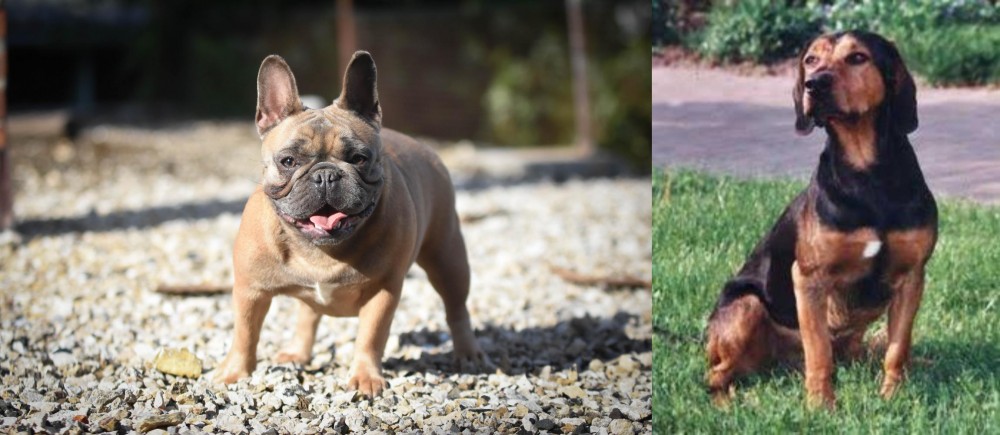 French Bulldog is originated from France but Tyrolean Hound is originated from Austria. French Bulldog may grow 15 cm / 5 inches shorter than Tyrolean Hound. French Bulldog may weigh 13 kg / 28 pounds lesser than Tyrolean Hound. Both French Bulldog and Tyrolean Hound has almost same life span. French Bulldog may have less litter size than Tyrolean Hound. Both French Bulldog and Tyrolean Hound requires Low Maintenance.
French Bulldog is originated from France but Tyrolean Hound is originated from Austria. French Bulldog may grow 15 cm / 5 inches shorter than Tyrolean Hound. French Bulldog may weigh 13 kg / 28 pounds lesser than Tyrolean Hound. Both French Bulldog and Tyrolean Hound has almost same life span. French Bulldog may have less litter size than Tyrolean Hound. Both French Bulldog and Tyrolean Hound requires Low Maintenance.
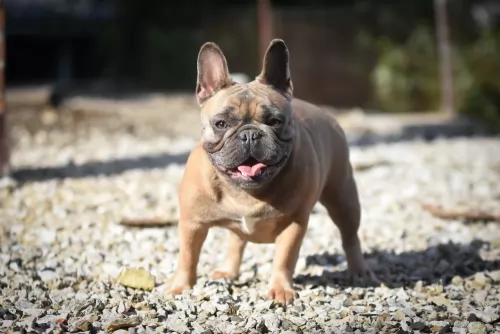 The french bulldog originated in England and are bred expecting small size bulldogs. Many lace workers in Nottingham had little bulldogs and when they emigrated to france, they brought their dogs with them. Soon they become popular in France and Europe. Then Americans showed interest in them.In 1896 frenchie was shown in United states in a show and after that they got their nickname "Frechie".
The french bulldog originated in England and are bred expecting small size bulldogs. Many lace workers in Nottingham had little bulldogs and when they emigrated to france, they brought their dogs with them. Soon they become popular in France and Europe. Then Americans showed interest in them.In 1896 frenchie was shown in United states in a show and after that they got their nickname "Frechie".
 The Tyrolean Hound, also known as Tyroker Bracke or Tiroler Bracke originates from Tyrol, Austria. It seems the dog was developed in the late 1800s for hunting.
The Tyrolean Hound, also known as Tyroker Bracke or Tiroler Bracke originates from Tyrol, Austria. It seems the dog was developed in the late 1800s for hunting.
This is a scenthound that is thought to have descended from Celtic Hounds, Foxhounds and Bloodhounds in the late 1800s.
The dog is a member of the FCI’s scent hound group. The dog was recognized as its own breed in 1908, and in 2006 it was recognized by the United Kennel Club.
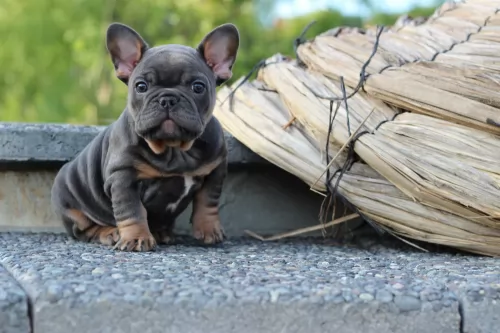 Frenchie is a good companion dog and has a powerful muscular body. They like to play but also likes to relax for more time. They are intelligent and training them is very easy until they think it a game. They are free thinkers and are not very good in obedience. Frenchies should not be leaved alone for a long time.They love spending time with humans and generally they get along with everyone. They are excellent watchdogs and alerts when strangers come.
Frenchie is a good companion dog and has a powerful muscular body. They like to play but also likes to relax for more time. They are intelligent and training them is very easy until they think it a game. They are free thinkers and are not very good in obedience. Frenchies should not be leaved alone for a long time.They love spending time with humans and generally they get along with everyone. They are excellent watchdogs and alerts when strangers come.
French bulldog suits very well in apartments. But they should be made to walk for fifteen minutes daily to avoid over weight. They should not be kept outside on hot days. Frenchies will be very happy if you stay in home. They will follow you wherever you walk inside the house. They love people so much, such that people who own a Frenchie can not imagine life without them.
 The Tyrolean Hound is a medium-sized to large dog. He stands at roughly between 43 to 50cm in height and can weigh between 20 and 27kg.
The Tyrolean Hound is a medium-sized to large dog. He stands at roughly between 43 to 50cm in height and can weigh between 20 and 27kg.
He is muscular, lean and compact. The double coat is short and smooth and can be red, tan, black or tri-colored. The ears are high set, are broad, floppy and long. The tail is long and is carried high.
Independent and intelligent the Tyrolean Hound is a hardworking dog, loving to be active. He has all the characteristics of a great pet and companion – loving, lively, intelligent, independent, easily trained and protective.
He’s the kind of dog that would suit a home with a large garden as opposed to living in the city. He is wary of strangers and has a loud bark to warn you of intruders. He has a friendly nature with his human family and makes a good playmate for children.
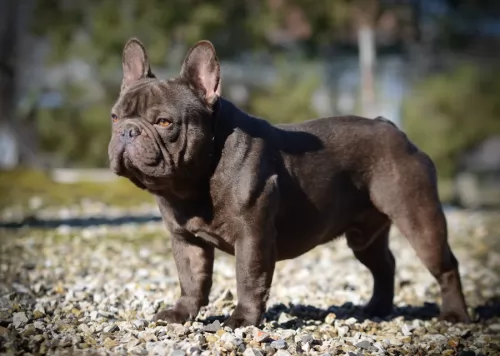 They are good children friendly dogs as they like to play with them. It will be good if they are supervised by an adult.
They are good children friendly dogs as they like to play with them. It will be good if they are supervised by an adult.
They are polite with everyone including other pets. They love to play games and chase balls but don't need much exercise.
Frenchies adapts well for apartment living but they don't like being alone for long time. They will not tolerate both hot and cold weather and so air conditioning will be better.
French Bulldogs are easy to train and are very much interested in playing.
 The Tyrolean Hound is a keen hunting dog loving to be outdoors and active, requiring large grounds to be happy.
The Tyrolean Hound is a keen hunting dog loving to be outdoors and active, requiring large grounds to be happy.
Once he comes indoors he is able to settle down with his human family and have some quiet time with them.
He is loyal and loving, but you are going to have to be prepared for an active lifestyle with this skilled hunting dog of yours.
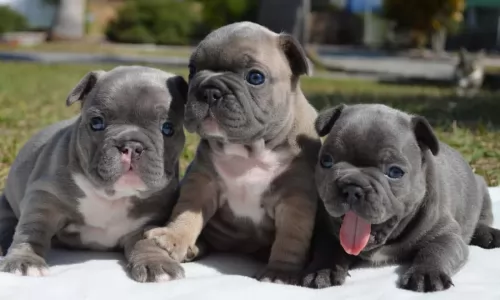 Frenchies can suffer from Von Willebrand's disease(VWD)and thyroid condition. Due to their flat faces they suffer from elongated soft palate or cleft palate. Because of their compacted air way they have inability to effectively regulate temperature.
Frenchies can suffer from Von Willebrand's disease(VWD)and thyroid condition. Due to their flat faces they suffer from elongated soft palate or cleft palate. Because of their compacted air way they have inability to effectively regulate temperature.
Any indication that the hair is unhealthy, such as brittleness and hair loss, should be addressed immediately to avoid any further damage. Hair loss becomes a problem when it becomes excessive, possibly due to disease or a particular condition.
 Because these dogs put everything into their hunting, injuries related to hunting can sometimes plague this energetic dog.
Because these dogs put everything into their hunting, injuries related to hunting can sometimes plague this energetic dog.
Apart from that, he is robust and can live to be 12 – 14 years of age. There are one or two common dog illnesses to look out for with this dog such as hip dysplasia or ear infections.
The large, floppy ears of the Tyrolean Hound are prone to ear infections. Unlike with dogs that have erect ears, these dogs don’t have their inner ears aired and the dampness, wax and dirt cause bacteria to build up which ultimately leads to an ear infection.
The hip joint forms abnormally, leading to chronic wear and tear together with inflammation. Sometimes the dog will squeal when he gets touched around his hips. The condition can worsen and sometimes the dog even becomes lame. He will need to get to the vet for something to control pain.
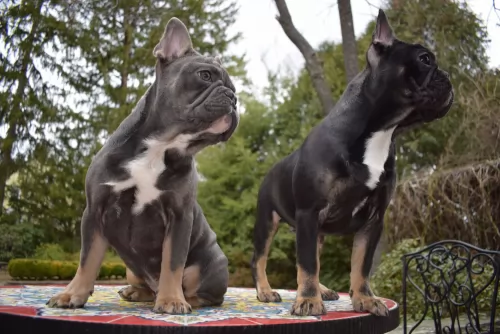 As with all dogs, proper nutrition makes your French Bulldog a happy, healthy pup. He should have his own food and water bowls. Don't feed your French bulldog puppy, uncooked meat or food that may have gone bad. Young puppies need relatively large amount of food in order to meat the demands of their rapidly growing bodies and their hectic lifestyle. Feed your puppy specially designed chewing treats from reputable pet stores.
As with all dogs, proper nutrition makes your French Bulldog a happy, healthy pup. He should have his own food and water bowls. Don't feed your French bulldog puppy, uncooked meat or food that may have gone bad. Young puppies need relatively large amount of food in order to meat the demands of their rapidly growing bodies and their hectic lifestyle. Feed your puppy specially designed chewing treats from reputable pet stores.
According to the French BullDog Club of America, there are no specific guidelines for feeding them. Options for feeding your French Bulldog are commercial dry food, canned food, raw food and homemade meals. Calories required for frenchie varies depending on size, age, activity level and metabolism.
Frenchies can be made to walk or run for a particular distances. Heavy exercises should not be given as they face respiratory problems. Avoid exercising them in hot weather as they have chances of getting heatstroke.
 He has a short coat and will simply require a brush twice a week. Because of the fairly large, floppy ears, he will need to have the inside of his ears checked for redness and the possibility of an ear infection.
He has a short coat and will simply require a brush twice a week. Because of the fairly large, floppy ears, he will need to have the inside of his ears checked for redness and the possibility of an ear infection.
This dog has always been used to plenty of exercise. He won’t adapt to life in the city on a tiny property. The ideal place for this dog is on a large property, preferably a farm.
Walks, hikes, swimming, ball games, hide and seek – he is a dog that can’t seem to get enough action – he wants to be in on all the action. He is intelligent and will also need mental stimulation.
If you were to buy your lean Tyrolean Hound some commercially manufactured food, you’d buy him food that was made for high energy dogs. You’d certainly want to make sure the food is of a high quality, packed with vitamins and minerals and natural ingredients.
He would also love some home-made food too. Raw meat occasionally would do him the world of good. This sort of food needs to be plain and simple such as boiled chicken, brown rice and vegetables.